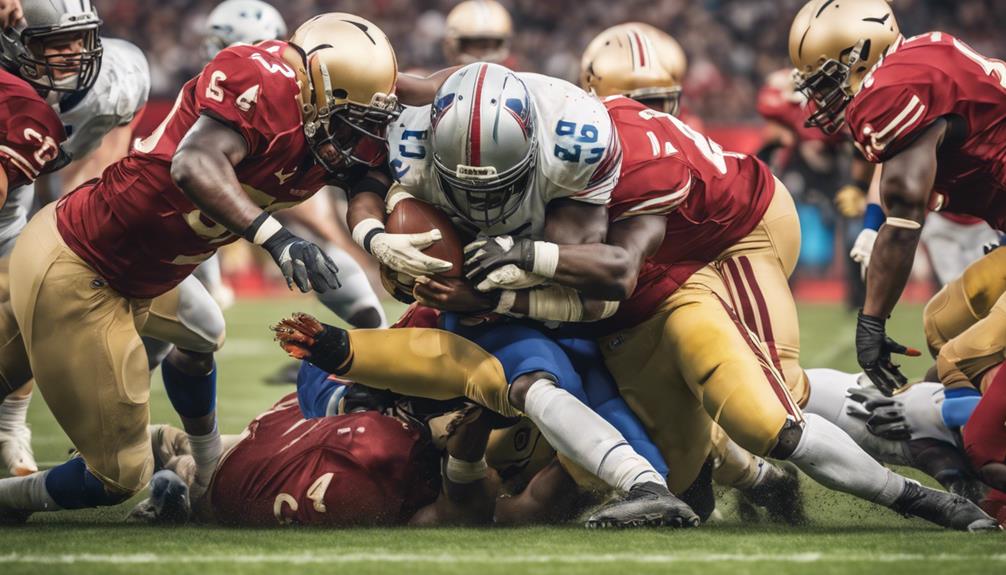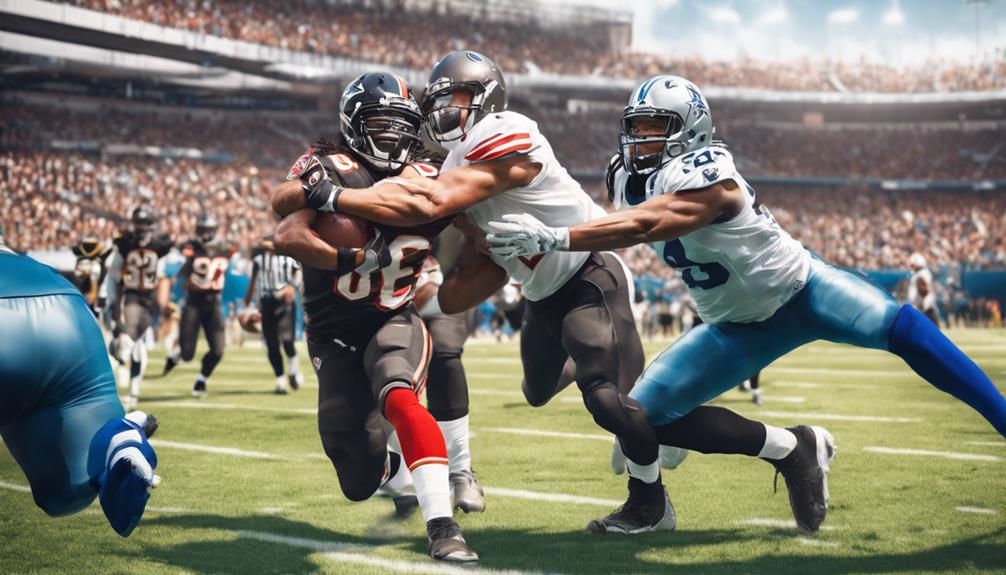When it comes to NFL takeaways and giveaways, the impact goes beyond mere statistics. Imagine the game-changing moments that can unfold with a single interception or a well-timed fumble recovery. These pivotal plays not only swing momentum but can also define the trajectory of an entire season. As you consider the intricate balance between defensive prowess and offensive ball security in the NFL, one question arises: How do teams navigate this fine line to tip the scales in their favor?
Impact of Turnovers on Game Momentum

Turnovers play a pivotal role in determining the shifting momentum of a game in the NFL. Momentum swings can occur rapidly, altering game outcomes in an instant. Teams with a positive turnover margin often find themselves in better positions to succeed. The correlation between turnovers and team success is undeniable.
When a team forces a turnover, the momentum swings in their favor. Suddenly, the energy on the field shifts, boosting morale and performance. Conversely, committing a turnover can deflate a team, leading to a swing in momentum that can be challenging to overcome. These momentum shifts heavily influence game outcomes, often deciding the winner in closely contested matchups.
In the NFL, understanding the impact of turnovers on game momentum is essential. Teams that can capitalize on turnovers while minimizing their own mistakes have a significant advantage. By recognizing the importance of turnover margin, teams can position themselves for success and increase their chances of coming out on top in highly competitive games.
Strategies to Minimize Giveaways
To reduce the number of giveaways in NFL games, you must implement strategic measures to protect possession of the ball effectively. Turnover prevention is important in maintaining momentum and securing victories.
One key aspect is emphasizing ball security during practices and games. Coaches should stress the significance of proper techniques such as gripping the ball tightly, keeping it high and tight, and being aware of defenders trying to strip it away.
Minimizing mistakes is another essential component in reducing giveaways. This involves offensive discipline, where players must focus on executing plays correctly, following assignments, and avoiding unnecessary risks.
Quarterbacks should make smart decisions when passing, avoiding risky throws into coverage that could result in interceptions. Running backs and receivers need to secure the ball and not fumble under pressure.
Importance of Defensive Takeaways

Generating turnovers on defense is essential for shifting momentum in NFL games and giving your team a significant advantage. Defensive pressure plays an important role in creating these game-changing interceptions that can turn the tide of a match in your favor. When your defense is able to force turnovers consistently, it not only disrupts the opposing team's rhythm but also boosts your team's morale and energy.
One popular symbol of defensive takeaways is the turnover chain, a physical representation of a team's success in forcing turnovers. Being part of a defense that consistently creates turnovers and gets to showcase the turnover chain can be a source of pride and motivation for players.
In NFL games, the turnover margin, which reflects the difference between turnovers gained and turnovers lost, is a key statistic that correlates strongly with winning outcomes. By focusing on generating defensive takeaways, you can increase your team's chances of success and put them in a favorable position to secure victories.
Effectiveness of Turnover Differential
Shifting focus to the effectiveness of turnover differential can provide valuable insights into how teams can gain a competitive edge in NFL games. The turnover margin, which is calculated by subtracting the total turnovers a team commits from the total turnovers they force, plays an essential role in determining a team's success. Teams with positive turnover margins often have better playoff chances due to their ability to protect the ball and capitalize on opponent mistakes. Analyzing turnover ratios can give a clear indication of how well a team is performing in regards to ball security and defensive pressure.
Let's take a closer look at how turnover differentials impact team success:
| Turnover Margin | Team Success | Playoff Chances |
|---|---|---|
| Positive | Increased likelihood of winning | Higher probability of making playoffs |
| Negative | Struggle to secure wins | Playoff chances diminish |
| Neutral | Results vary | Playoff chances uncertain |
Key Players in Creating Turnovers

Key players play an essential role in creating turnovers during NFL games. Their player impact and defensive skills can change the course of a match in an instant.
Here are some key ways in which these players contribute to creating turnovers:
- Ball Hawk Skills: Players with exceptional ball-hawking abilities have a knack for intercepting passes and forcing fumbles, disrupting the opponent's offense.
- Tackling Prowess: Strong tacklers can jar the ball loose from ball carriers, leading to fumbles that can swing momentum in their team's favor.
- Awareness and Instincts: Players with high football IQs can read plays, anticipate passes, and react quickly to capitalize on the slightest mistakes by the offense.
- Strip-Sack Specialists: Pass rushers who excel at strip-sacks not only bring down the quarterback but also have the finesse to strip the ball away, creating game-changing turnovers.
These key players with their defensive skills and impactful plays are essential in forcing turnovers and giving their teams the edge on the field.
Conclusion
Overall, in the high-stakes world of NFL football, the battle between takeaways and giveaways can make or break a team's success.
By minimizing mistakes and capitalizing on defensive opportunities, teams can gain vital momentum and secure victories.
Key players who excel at creating turnovers are invaluable assets, while those who struggle with ball security often find themselves on the losing end.
In the end, the turnover battle remains a pivotal factor in determining the outcome of games.




